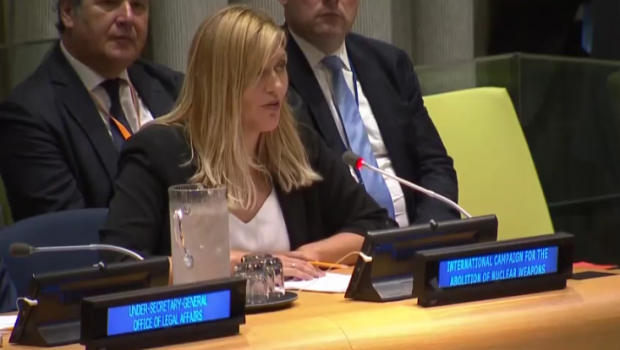Beatrice Fihn, the executive director of ICAN, delivered the following remarks at the signing ceremony for the UN Treaty on the Prohibition of Nuclear Weapons in New York on 20 September 2017:
Mr Secretary-General, President of the General Assembly, Excellencies,
The International Campaign to Abolish Nuclear Weapons has worked long and hard for this treaty to come into being. ICAN is a vibrant campaign in over 100 countries, comprised of people who act with determination, hope and confidence.
At ICAN we knew that we would eventually get to this historic day when the Treaty on the Prohibition of Nuclear Weapons opens for signature. We are seeing, today, international law standing up against weapons of mass destruction, prohibiting the use, possession and development of nuclear weapons.
This treaty represents the determination of the survivors of the atomic bombings of Hiroshima, Nagasaki, and nuclear testing around the world. And it establishes a legal obligation to address the harm that these weapons cause.
In many countries, the victims of nuclear weapon use or testing have struggled for the full realization of their rights. Indigenous communities, already victims of social and political marginalisation, have been marginalized further still – by transgenerational cancers, by contamination of traditional lands.
Representatives of these communities spoke during the negotiation of this treaty. Their voices were heard by the States that participated in those negotiations. And even if their own governments, in shame, ignore their voices – international law is responding to those voices in the treaty signed here today.
I am very honored that we have representatives of the survivors of the atomic bombings of Hiroshima and Nagasaki here at this ceremony, and I know many more who have experienced the devastating consequences of nuclear detonations are watching this ceremony from home. Thank you – for the testimony you have provided, for the work that you do, and for all that you contributed to making this treaty a reality.
You banned nuclear weapons. It is a treaty that honours the struggle of victims that have died – and that honours the work of survivors who are struggling still. And we will continue to work together. The International Campaign to Abolish Nuclear Weapons will work with states and survivors, with international organisations and UN agencies, and with our partners across civil society to build the strength of this treaty over time.
This has not been an easy process; the treaty has been called “divisive” by those that still ascribe value to nuclear weapons and many of them will try to work against this. But over time, this treaty will stand strong – because it is based on strong foundations. It is morally right, and it is coherent with the framework of international law.
Important progress is rarely easy. Groundbreaking steps forward do not start with consensus agreements. There was a lot of resistance when slavery was abolished. There was plenty of opposition when women fought for the right to vote. The fights for civil rights, to end apartheid, these weren’t met with unanimous support by all.
Progress doesn’t just happen when everyone is ready, it must be fought for, and someone has to be brave and lead. And we are seeing leadership here today. The states that negotiated. The states that will sign here today and over the weeks ahead. You are the states that are showing moral leadership – in a world that desperately needs moral leadership today.
This treaty will always be open to all states to join. States that chose to not join this treaty now will always be welcome in the future.
Today, we are putting nuclear weapons in the same category as other unacceptable weapons. Like the conventions prohibiting chemical and biological weapons, landmines and cluster munitions, this treaty bans an entire category of weapons. It strengthens the norm that weapons that cause unacceptable harm for civilians cannot remain legal – and that nuclear weapons are no longer an exception to these norms.
This is what a real step looks like. And for our shared human society, this is a step for the better.
Thank you.










